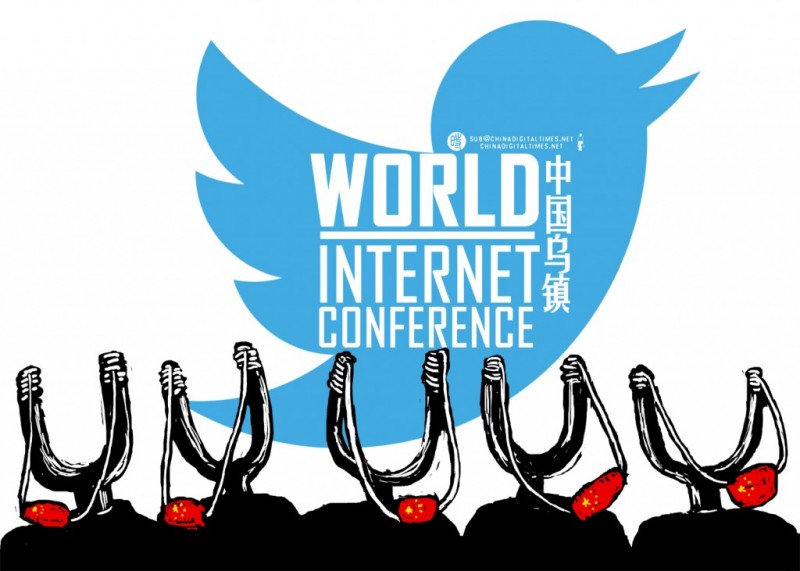Wuzhen, China's futuristic town in the Zhejiang province, said hello and goodbye to the World Internet Conference last week. Many, of course, find it ironic that China—where the government blocks hundreds of foreign websites—hosted a summit about the World Wide Web, but local commentators seemed unfazed. Several speakers at the conference even argued that the outside world must accept China's confidence in its Internet regulations and understand that foreign businesses cannot profit in China without obeying local laws.
Conference attendees enjoyed special, temporary access to hundreds of blocked websites overseas. But throughout the rest of the country, the Chinese government stepped up censorship efforts. Edgecast, one of the world's largest content delivery networks (CDNs), experienced a DNS “poisoning” attack which left thousands of websites and mobile apps inoperable across China.
GreatFire.org, a website devoted to monitoring online censorship in China, claims the Chinese authorities are risking massive “collateral damage” by disrupting access to large numbers of apolitical sites in order to protect the state's sovereignty over the domestic network. For example, the attack on Edgecast inadvertently blocked Sony Mobile's global and Chinese sites, The Atlantic, Drupal.org, Gravatar, and others.
According to China's official media, hosting the Internet conference was an effort to “show confidence in sharing China's opinion on how to face online threats and how to enhance international cooperation online.” China's confidence, no doubt, comes largely from its enormous market of 632 million Internet users, 527 million of whom access the Web using mobile devices. Statisticians project there will be 850 million Internet users in China by 2015.
Many interpret China's Internet confidence to signal the country's growing determination to impose a Chinese approach to Internet governance worldwide. Su Xinghe, a Chinese commentator on tech news, says of China's new assertiveness:
极权在互联网领域的管控比以往任何时代都要严密,与一盘散沙的美国网路相比,中国的网路更加有组织、有纪律。20年来,从各种关于“备案”的法律法规,到广电总局等政府机构下达的内容限制令,再到对网路“有害资讯”的清除,以及对发布这些“有害资讯”的网路使用者的打击,中国互联网的发展可谓一日千里,为世界各国提供了相当宝贵的经验。[…]
互联网一直被当作意识形态领域斗争的前沿阵地,“带鱼”的上位和“野鸡”网站的兴起表明,当局发起了一场“占领互联网”的行动。以红色传统、社会正能量和歌功颂德为主体内容,以打击西方反华势力和国内自由民主思潮为抓手,充分利用资源和管道优势,让那些当局希望的内容充斥互联网——就如同文革时铺天盖地的大字报一样,给民众施以强力洗脑和强制服从的压力。适逢其时的世界互联网大会,便于当局将这样的内容更趋于官方化,在话语领域起到更好的压制作用。
Authoritarian power is good at using the Internet to monitor people. When compared with the United States’ loose control over the Net, China is more organized and disciplined. In the past 20 years, so many rules and regulations have been implemented [to restrict Internet service and content providers. Government authorities, including the State Administration of the Press, Publication, Radio, Film, and Television, keep issuing content-restriction directives and deleting “harmful information” on the Web. The distributors of harmful information are penalized. The development of Internet governance is far-reaching and this experience is valuable to other countries. […]
The Internet is considered to be at the forefront of China's ideological struggle. The rise of state-sponsored celebrities like Zhou Xiaoping and state-sponsored websites like “Phoenix” demonstrate that the authorities have launched a campaign to “occupy the Web” with the Chinese Communist Party's red tradition and “positive energy as praise” to help suppress anti-Chinese and Western values, like freedom and democracy. By controlling Internet resources and content platforms, the authorities fill the Web with the kind of content they want people to see, similar to the posters that covered every street corner during the Cultural Revolution. The objective is to brainwash people and use political pressure to make them submissive. Hosting the World Internet Conference, China's authorities can legitimize its practice in official language and further repress dissents.
In what was likely a Freudian slip, state-sponsored online celebrity Hua Qianfang praised China's “big-nation confidence” as “Sima Zhao's mind“, a Chinese idiomatic expression used to describe a hidden and immoral intention of usurping the throne or seizing power. During the World Internet Conference, many Chinese netizens repeated the idiom to mock the authorities’ hidden intention.
In Chinese, the whole expression reads, “Everyone on the street knows what's in Sima Zhao's mind.” The hidden intention is implied, and left unsaid. In fact, the director of China's State Internet Information Office, Lu Wei, said in the World Economic Forum, (via the China Digital Times):
Freedom and order are twin sisters, and they must live together […] The same principle applies to security. So we must have a public order [internationally]. And this public order cannot impact any particular local order. […] What we cannot permit, is the taking advantage of China’s market, of profiting from Chinese money, but doing damage to China. This will absolutely not be permitted. It is unacceptable to harm China’s interests, to harm China’s security, or to harm the interests of China’s consumers. Assuming respect for this bottom line any internet company is welcome in China.
The DNS attack on Edgecast and its “collateral damage” to thousands of business websites thus amounts to what Liu Wei says is China's determination to maintain “local order,” despite certain economic costs.
As China's role online grows and it becomes a key player in the shaping of global Internet governance, its approach to sovereignty still worries human rights activists. William Nee, a China researcher at Amnesty International, urged international business leaders to speak out about online freedom at the Conference, but the subject unfortunately didn't make the program.
As digital sovereignty continues to shape the future of Internet governance, it seems it will be left to local civil society to play a more significant role in China's fight for an open and free Internet.








